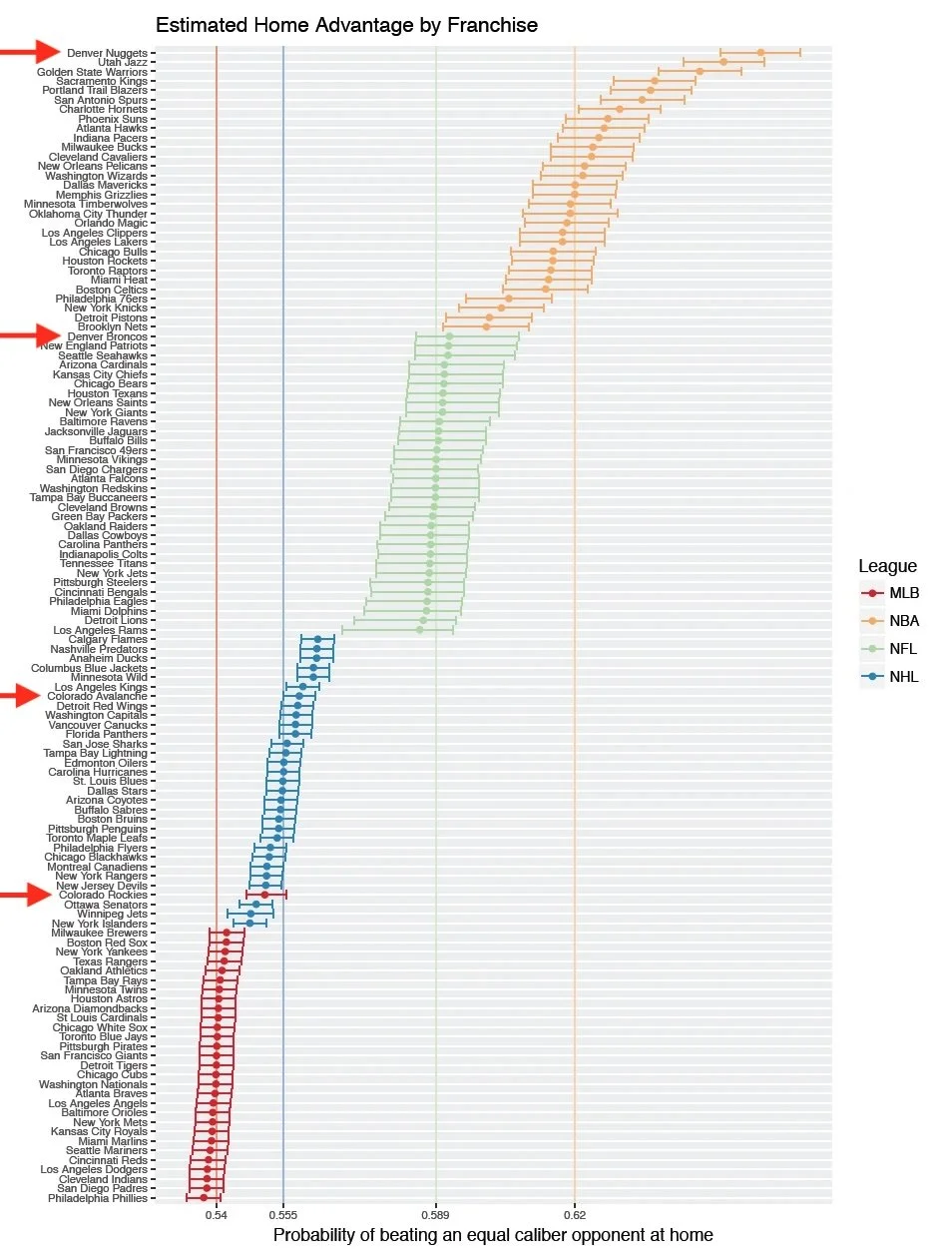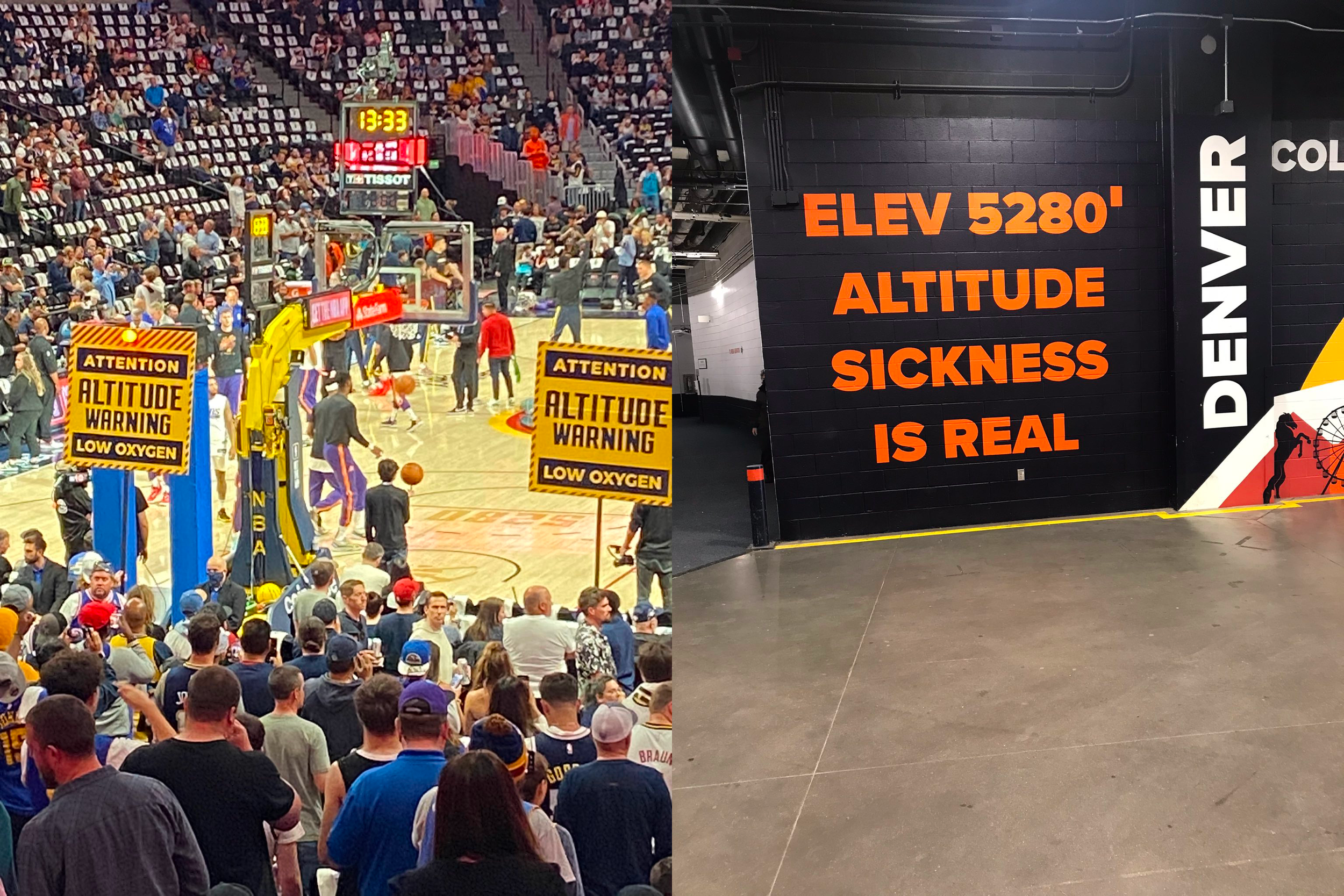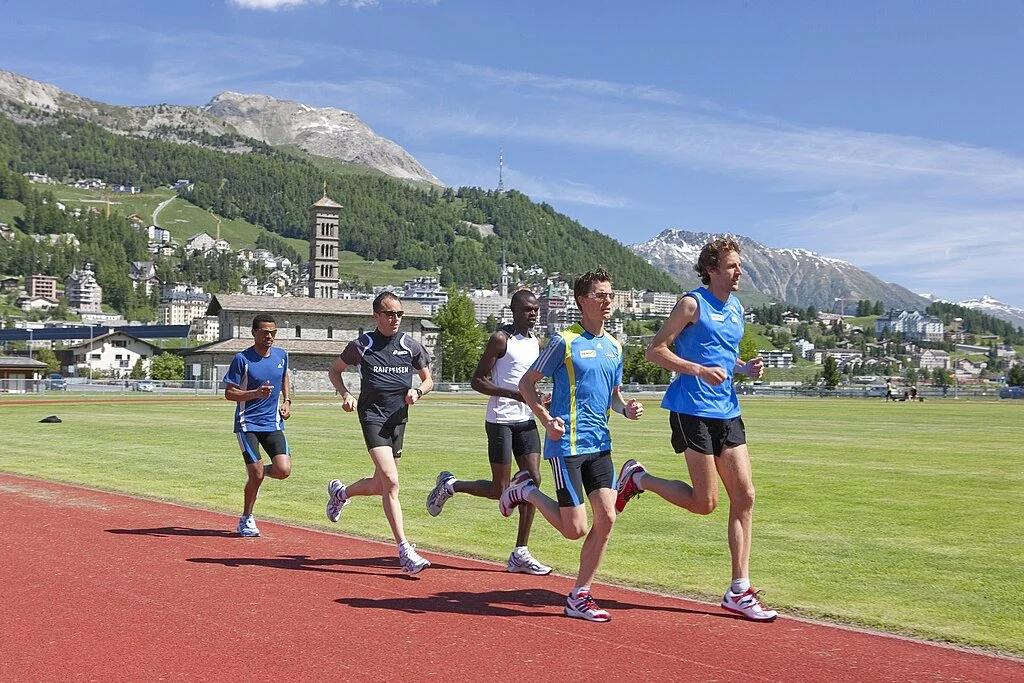Do sports teams that train in high altitudes have a home advantage?
The short answer
There is strong statistical evidence that high-altitude teams have a home advantage, largely because visiting players experience reduced oxygen intake and quicker fatigue at elevation.
The long answer
It's high time we level up our understanding of whether training in high altitudes elevates a sports team's performance and, if so, why.
Let's start with the basics of how higher elevations affect the human body:
How does altitude affect the human body?
Air is a mixture of gases found in Earth's atmosphere, comprising about 78% nitrogen, 21% oxygen, and 1% argon, along with other trace gases. This proportion of gas molecules stays the same, regardless of elevation.
But at higher altitudes, these molecules are more spread out. As a result, you’re breathing in less oxygen in the mountains than you would at sea level.
As altitude increases, air pressure decreases. This decrease in air pressure leads you to breathe in less oxygen per breath than at sea level.
When you take in less oxygen with each breath, your blood delivers less of it to your muscles. But muscles need oxygen to convert glucose into energy, so at higher altitudes you fatigue faster.
Fortunately the human body is awesome and can adapt to the thinner air by creating more red blood cells, which use hemoglobin to carry and deliver oxygen throughout your body.
Source: Torontek
When you spend time at higher altitudes, your body produces more erythropoietin, a hormone that triggers the production of red blood cells. With more red blood cells, your body becomes better at delivering oxygen to your muscles and organs, reducing fatigue. The process of acclimating takes anywhere from a few days to over a week.
Do sports teams that train in high altitudes have a home advantage?
Yes, there is data showing that high-altitude sports teams win home games more frequently than visiting teams unacclimated to the the elevation.
Here's a compelling chart from a statistical research report that found that Denver, Colorado sports teams have the largest home advantage in the NBA, NFL, and MLB (and a top-ten in the NHL).
Chart showing American major league teams' estimated home advantage. Denver teams are marked with a red arrow. Source: MSU Denver
Opposing teams coming to the "Mile High City" (or the "1.61 Kilometer High City") have a clear disadvantage because they're not acclimated to the altitude. For example, when the Denver Nuggets basketball team plays home games, they have a 67% win probability against equally matched opponents, giving them ~2.5 extra wins per season than the Brooklyn Nets, which have the lowest home advantage.
It's important to note that home teams generally do have an advantage (crowd support, no travel fatigue, venue familiarity, etc.), but this research suggests that, even if you control for these factors, altitude alone contributes significantly to Denver's home advantage.
Athletes are well-aware of this challenge when they come to Denver. Former Patriots linebacker Tedy Bruschi once commented on the high-altitude challenges:
And Denver teams intentionally leverage their opponents' quick-to-fatigue-in-high-altitude challenges to their advantage. The Denver Nuggets aim to exhaust their opponents with one of the fastest paces in the NBA. The Denver Broncos have been known to play quick, no-huddle offense late in the game to capitalize on the defense's fatigue.
And Denver fans and facilities aim to psych out their opponents by reminding them they're playing at a disadvantage.
I know this has been a very American-sports-focused answer, so I'd be remiss if I left out what the data say about how altitude affects the most beautiful game.
There was a statistical analysis conducted on FIFA's 100+ year database of 1,460 football matches held in 10 countries which also showed that high-altitude teams had a clear home advantage. In fact, for every extra 1,000 meters altitude difference between the home and away team, the home team's margin of victory improved by half a goal. It's not just American teams that get winded at high altitude.
Do sports teams that train in high altitudes have an away advantage?
The reason why high-altitude home teams win more seems to be because their opponents fatigue faster and perform worse. But if living and training at high altitude improves your body's oxygen delivery, then theoretically you should be able to perform better athletically at sea level.
So it begs the question: Do sports teams that train in high altitudes have an away advantage?
This phenomenon has been widely studied in individual sports like running, swimming, and cycling. When an altitude-trained athlete competes at sea level, they're able to deliver more oxygen to their muscles, which gives them a performance boost of about 1-2%. That's why many elite athletes choose to live and train at higher altitudes.
"Swiss Olympic training base" by Christof Sonderegger is licensed under CC BY-SA 3.0.
But what about team sports? There is little published research showing evidence of improved team sport performance from altitude training. However, we do have some statistical evidence from ... you guessed it: Denver.
Analyses of the Denver Rockies baseball team have shown that their record at away games is not particularly strong. Since their first season in 1993, they've run up a .545 winning percentage at home and .396 on the road. That 150-point differential is the biggest home/away gap in the MLB. If you're a Rockies fan, it's going to be much more fun to cheer them on at home than on the road.
"Coors Field 2015" by Thelastcanadian is licensed under CC BY-SA 4.0.
There's a reasonable explanation for why we don't see enhanced performance from high-altitude sports teams when they play at sea level.
We know that altitude training can improve an athlete's aerobic base because of increased red blood cell production. But team sports are a mix of aerobic (cardio) and anaerobic (sprints and power) exercise, and performance also hinges on factors like strength, skills, and team coordination.
Altitude-trained sports teams certainly may experience a marginal boost in their aerobic fitness when they play at sea level, but that edge may not overcome the usual disadvantages of being on the road, like travel fatigue, unsupportive crowds, and different weather.
Curious about how the world works?
Today You Should Know is a free, weekly email newsletter designed to help you learn something new every Friday.
Subscribe today 👇
Check out some other curious questions:
Sources
Bishop, D. J., & Girard, O. (2013). Determinants of team-sport performance: Implications for altitude training by Team-Sport Athletes. British Journal of Sports Medicine, 47(Suppl 1), i17–i21. https://doi.org/10.1136/bjsports-2013-092950
Clemens, B. (2021, August 25). The Rockies are Historically Road-Averse. FanGraphs Baseball. https://blogs.fangraphs.com/the-rockies-are-historically-road-averse/
D’Hooghe, M. (2013). Football and altitude: A FIFA vision. British Journal of Sports Medicine, 47(Suppl 1), i1–i1. https://doi.org/10.1136/bjsports-2013-093006
Garber, G. (2012, October 10). Toughest venues: Altitude adjustment. ESPN. https://www.espn.com/nfl/story/_/id/8480201/nfl-hot-read-best-home-field-advantage-no-5
Girard, O., & Chalabi, H. (2013). Could altitude training benefit team-sport athletes? British Journal of Sports Medicine, 47(Suppl 1), i4–i5. https://doi.org/10.1136/bjsports-2013-092807
Levine, B. (2016, November 21). How high-altitude training can benefit elite endurance athletes like runners and swimmers. Heart | UT Southwestern Medical Center. https://utswmed.org/medblog/high-altitude-training/
McSharry, P. E. (2007). Effect of altitude on physiological performance: A statistical analysis using results of international football games. BMJ, 335(7633), 1278–1281. https://doi.org/10.1136/bmj.39393.451516.ad
Nunez, K., & Minnis, G. (2020, December 2). All About High Altitude Fitness Training. Healthline. https://www.healthline.com/health/altitude-training
Olson, C. (2025, February 22). Why does traveling make you tired?. Today You Should Know. https://www.todayyoushouldknow.com/articles/why-does-traveling-make-you-tired
Park, H., Hwang, H., Park, J., Lee, S., & Lim, K. (2016). The effects of altitude/hypoxic training on oxygen delivery capacity of the blood and aerobic exercise capacity in elite athletes – a metaanalysis. Journal of Exercise Nutrition & Biochemistry, 20(1), 15–22. https://doi.org/10.20463/jenb.2016.03.20.1.3
Watson, M. (2022, March 1). Advantage, altitude: exploring the largest home advantage in sports. MSU Denver RED. https://red.msudenver.edu/2018/advantage-altitude-exploring-the-largest-home-advantage-in-sports/











We Americans sure do like American things.